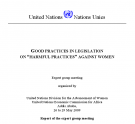UN Report: Good Practices in Legislation on 'Harmful Practices' against Women
| Attachment | Size |
|---|---|
| Reportharmfulpractices_UN_2009.pdf | 394.88 KB |

The forms of violence referred to as “harmful cultural or traditional practices” have been addressed by the United Nations for many years. These forms of violence include female genital mutilation, female infanticide and prenatal sex selection, child marriage, forced marriage, dowry-related violence, acid attacks, so-called “honour” crimes, and maltreatment of widows. Earlier attention within the United Nations to these forms of violence focused on their effects on the health of women and children, and on the importance of marriage based on the full and free consent of the intending spouse. In the 1990s, they became clearly acknowledged as forms of violence against women constituting gender-based discrimination and a violation of women’s human rights.
States are obligated under a comprehensive international legal and policy framework to enact, implement and monitor legislation on all forms of violence against women, including “harmful cultural or traditional practices” (hereinafter “harmful practices”). The international human rights treaty bodies, in particular the Committee on the Elimination of Discrimination against Women, regularly call on States parties to adopt legislation to eliminate “harmful practices”. Article 16(2) of the Convention on the Elimination of All Forms of Discrimination against Women specifies that the betrothal and the marriage of a child shall have no legal effect, and all necessary action, including legislation, shall be taken to specify a minimum age for marriage and to make the registration of marriages in an official registry compulsory. The 1993 General Assembly Declaration on the Elimination of Violence against Women1 states that “States should condemn violence against women and should not invoke any custom, tradition or religious consideration to avoid their obligations with respect to its elimination.” The General Assembly and other inter-governmental bodies of the United Nations have called on governments to develop and fully implement laws and other measures to eradicate harmful customary or traditional practices, including female genital mutilation, early and forced marriage and so-called honour crimes. The General Assembly has called on Member States to “review and, where appropriate, revise, amend or abolish all laws, regulations, policies, practices and customs that discriminate against women or have a discriminatory impact on women, and ensure that provisions of multiple legal systems, where they exist, comply with international human rights obligations, commitments and principles.”


